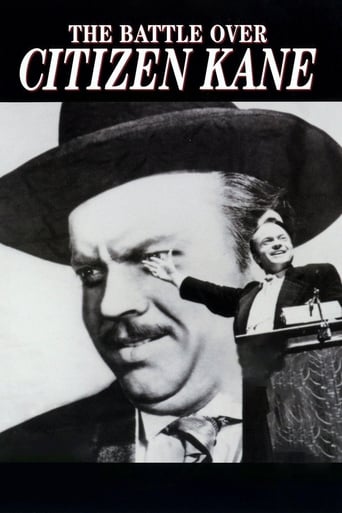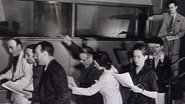Robert J. Maxwell
Both William Randolph Hearst and his nemesis, Orson Welles, wind up as tragic figures. This is a PBS presentation, an episode in "The American Experience," which in his later years Hearst would have abhorred.It's paid for by taxes, and Hearst is seen coming up with a very modernistic rant about Roosevelt and HIS tax program -- "impudent...and, yes, revolutionary." You can read the same uncrafted expressions of anger on today's newsboards, like Newsvine.Both men were ahead of their time. Hearst, beginning as a benign humanist, turns out to be Scrooge once he gets terribly rich. (His estate at San Simeon is half the size of Rhode Island.) Those baby boomers, once revolutionaries who tried levitating the Pentagon during the Vietnam years, now tearing their remaining hairs out over the national debt, must know exactly the trajectory of Hearst's evolution from iconoclast to skinflint.Welles doesn't fare much better. He's always lunging ahead, against the odds. Sometimes he wins -- that "War of the Worlds" broadcast, which was very good indeed. And sometimes he loses. In his later life he did nothing BUT lose.An obese Welles died at 69. Hearst lived well into his 80s. Rockefeller lived into his 90s. It may be true, as F. Scott Fitzgerald said, "The very rich are different from you and me." Fitzgerald died in his 40s in a modest Los Angeles apartment.
Michael_Elliott
Battle Over Citizen Kane, The (The American Experience) (1996) *** (out of 4) Season eight of The American Experience featured this documentary about the making of Orson Welles Citizen Kane, which would cause the director to do battle with William Randolph Hearst, the man Kane is based on. There's one huge problem with this film and that's that the film takes way too much time to dig into the actual making of the movie. We spend about an hour getting to know both Welles and Hearst, which is fine but I think too much time is spent here. We learn how Hearst ended up making his fortune (as well as losing) and how Welles became an overnight sensation with The War of the Words radio show. The most interesting aspects happen when we get to the making of the film and how Welles was running out of time to get a movie on the screen as many felt he'd never film anything. When the actual battle starts between the two men it's rather shocking and perhaps sad that neither Welles or Hearst had the decency to try and meet with one another to settle this thing instead of letting it take both of them over. The even sadder thing is that the movie Citizen Kane ended up being a bio of Welles as he ended up just like the character. I've often wondered if Welles got lost in the Kane character or perhaps he was the Kane character and this documentary makes it seem like he was the Kane character.
Ipsissimus
There must still be relatives of William Randolph Hearst around who had something to do with this polished piece of junk. That this "documentary" was included as part of Warner's DVD of Citizen Kane is a disgrace, and a disservice (to say the least) to Welles. The whole tone of this film is anti-Welles, and, if not pro-Hearst, at least fairer to him than to Welles. It seems that every time an image of Welles appears on screen dark and sinister music underscores it, and the narration becomes ominous and insinuating, but when Hearst is shown happy, upbeat music is the rule. Welles is made out to be an arrogant, sometimes violent man, and no opportunity is missed to tell some denigrating anecdote about his appetites and ego. Hearst is treated far more gently, even though he was by far the more dangerous and destructive of the two men. Factual errors abound in this silly film; such as the totally inaccurate notion that Hearst was successful in ruining Welles, if not Citizen Kane. The sad truth is that Welles largely was his own worst enemy, abandoning projects like The Magnificent Ambersons before it had been completed. If Hearst was so successful in defeating Welles, why was it that the film was nominated for nine Academy Awards? That it "only" won one is cited as proof that Hearst had destroyed the picture AND Welles. Rubbish.
jaybabb
-Maybe Spoilers herein-This film is a documentary about the conflict Between Orson Welles & William Randolph Hearst over the movie "Citizen Kane." There are interviews with many of the people involved with the film. Hearst was a powerful newspaper publisher who sensationalized the news. Many of the stories in his papers were made up. Welles was a radio and theatrical producer who also loved sensationalism. His plays & radio programs were like nothing else seen at the time. His "War of the worlds" broadcast scared the living daylights out of people since it sounded so real. Both men had at least one characteristic in common: They both believed that the ends justify the means. This is how they became successful and how in the end-destroyed themselves and each other.I have two thoughts regarding this battle: 1. I believe that if Hearst wouldn't have raised a racket over the film, The movie would have been destroyed. Because, People would not believe that Hearst was the kind of man Welles portrays. However, since he did raise a racket people wondered if the events depicted in "Citizen Kane" are true. Otherwise, he wouldn't have raised a racket. 2. These two men were their own worst enemies. There lifestyles and The way they conducted business would eventually come back to haunt them and it did. If you fly too high too soon, you will crash-what goes up MUST COME DOWN! The film "Citizen Kane" set these two on a collision course-they did 15 rounds in the ring and killed each other in the process.Both the newspaper and film industries can learn many lessons.1. The newspaper industry: Never let one man have that much control. There must be accountability here-It is irresponsible to make up stories about living people. In many cases(As he did with Orson Welles)if he didn't like you it was not pretty. This is not what the founding fathers had in mind when they gave us freedom of the press.2. The film industry: Never EVER give complete control to one man. While Welles made a brilliant film, it was about a real living person. Regardless how one feels about Hearst, the fact is it is irresponsible to portray him the way he did in the film.In short-another way of saying this for both: NEVER LET THE IMMATES RUN THE ASSYUM!!The only winner in this battle is the film itself. Perhaps Welles could have at least a little consolation over the fact-that this film is now considered one of the greatest films of all time. And in this day of the DVD format-this film will be forever Preserved. Thank God for that!




